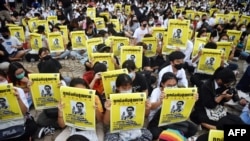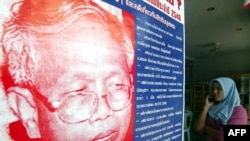Thailand is set to ratify a U.N. convention that would see new ways to protect at-risk individuals from being extrajudicially abducted, kidnapped or disappeared.
The Southeast Asian country with a poor human rights record in recent years is seeking a seat on the U.N. Human Rights Council, and apparently hopes ratification will help its candidacy later this year, human rights advocates say.
The Thai Foreign Ministry told VOA that the goal is for the convention to be fully ratified by the government in Bangkok by June 13.
Thailand signed the International Convention for the Protection of All Persons from Enforced Disappearances (ICPPED) in 2012 yet has not formally ratified it.
"On May 14, 2024, Thailand deposited an Instrument of Ratification to the International Convention for the Protection of all Persons from Enforced Disappearance. Thailand reaffirms its commitment to protect all persons from enforced disappearance," Thailand's Ministry of Foreign Affairs told VOA, noting the process is expected to end in ratification within a month.
ICPPED will be Thailand's eighth core international human rights treaty, the ministry said.
Thailand has a long history of enforced disappearances, records show. Between 1980 and 2023, the U.N. Working Group on Enforced or Involuntary Disappearances reported that 77 of 93 documented "enforced or involuntary disappearance" cases in Thailand remain unsolved.
Sanhawan Srisod, an associate international legal adviser at the International Commission for Jurists, told VOA that Thailand is taking public steps to try to improve its rights reputation.
"Thailand has illustrated its willingness to take a leadership role in safeguarding human rights, not only at a global level but also at the domestic level," she said.
In February 2023, for example, Thailand passed the Act on Prevention and Suppression of Torture and Enforced Disappearance.
When in force, the U.N. treaty on protection is expected to reduce the number of "enforced disappearances," rights advocates say. A mechanism will be in place for requests to protect individuals at risk to be sent to the U.N. Committee on Enforced Disappearance, which is the supervisory authority of the convention.
"One immediate change is that relatives, legal representatives, or any other person having a legitimate interest in the potential victims of enforced disappearance will be equipped with more tools to seek the truth. The committee can urgently request state parties like Thailand to take measures to ensure that a disappeared person, including dissidents and political refugees, is located and protected, taking into account the urgency of the situation," Sanhawan said.
Phil Robertson, director of Asia Human Rights and Labour Advocates (AHRLA), said he hopes the Thai government works to improve conditions for dissidents and critics.
"One hopes that this ratification will see Thailand turn the corner and end such disappearances once and for all, but it will require real political commitment to stop the culture of intimidation and impunity which makes disappearing critics and rivals so easy," he told VOA.
Robertson said the treaty should be retroactive so dozens of unsolved cases can be re-examined.
"If they are serious about this issue, the Thai authorities would systematically re-open and investigate those cases, but there is no indication they are preparing to do so. For the families of the dozens of victims of enforced disappearance vainly waiting for closure and accountability, this ratification won't mean much since it's not retroactive," Robertson said.
One such case has reached a 20th anniversary. Somchai Neelapaijit, a prominent Thai human rights lawyer, disappeared in Bangkok in 2004.
Thailand announced last year it was seeking a seat on the U.N. Human Rights Council and was preparing for the September vote at the U.N. General Assembly that will determine which nations hold seats for the 2025-27 term.
Bangkok now has boosted its chances to secure a U.N. seat, Robertson says.
"Thailand needed something to show for its campaign to be elected to the U.N. Human Rights Council in September, so ratifying this convention became the easiest pledge they could make."
But for a country that has seen military coups and opposition crackdowns in recent years, Thailand's human rights record remains a concern.
The crackdown on dissidents stemming from the 2020 anti-government and monarchy reform protests has seen nearly 2,000 people prosecuted for expressing opinions and political views. This includes 272 people facing lèse-majesté charges, which prohibits criticism of Thailand's monarchy. Under Article 112 of Thailand's Criminal Code, each charge can warrant a maximum 15-year prison sentence.
Human rights advocates have expressed concern that some political activists have been refused bail and remain in custody in pretrial detention. Currently 27 detainees are being held under those conditions, according to Thai Lawyers for Human Rights.
Earlier in May, political activist Netiporn Sanesangkhom, also known as "Bung," died of cardiac arrest while in custody following a hunger strike. She was facing lèse-majesté charges and her bail had been revoked.
"Thailand does not deserve a seat on the U.N. Human Rights Council if it continues to imprison people for speaking the truth to power," Akarachai Chaimaneekarakate, advocacy lead at Thai Lawyers for Human Rights, told VOA.
Sanhawan, of the ICJ, said that while political activists languish in Thai prisons, questions over human rights practices hang over the country.
"The allegations of rights violations that continually haunt Thailand should be addressed, including the alleged misuse of the judicial process against political dissidents based on non-human rights compliance laws which have been consistently criticized by U.N. bodies for a long time."






